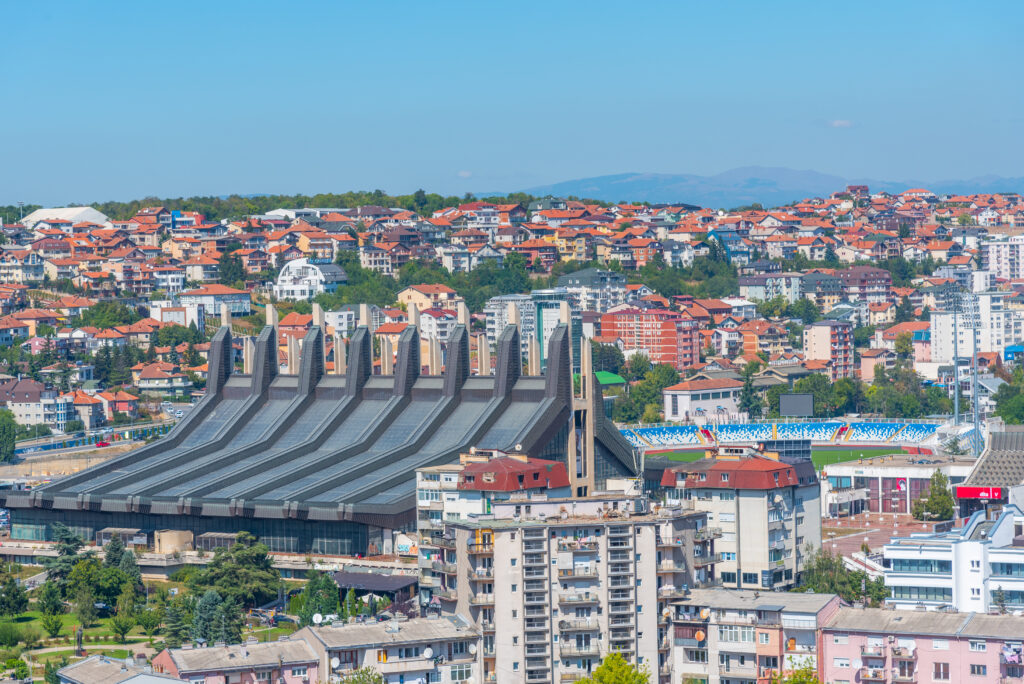The Aftermath of the War, Independence and the Issue of Status
The end of the Kosovo conflict was legitimized through the Kumanovo Agreement, signed on June 9, 1999. This agreement addressed several aspects, namely: the withdrawal of Serbian troops from Kosovo’s territory; the introduction of the KFOR (Kosovo Force) military force, led by NATO and under UN administration, aimed at establishing and maintaining a peaceful environment in the area; ensuring the safe return of refugees and displaced persons to Kosovo[1].
To assist NATO forces in Kosovo, the Kosovo Liberation Army (KLA) was transformed, through demilitarization in accordance with UN Security Council Resolution 1244, into the Kosovo Protection Corps. The same resolution also provided for the establishment of a United Nations protectorate in the form of the United Nations Interim Administration Mission in Kosovo (UNMIK), whose role was to govern the province of Kosovo, ensure the necessary conditions for a peaceful life for all citizens, and maintain stability in the Western Balkans.
The main post-war objective of international forces focused on efforts to return the Albanian refugee and displaced population to Kosovo’s territory. Nearly one million Kosovar Albanians were assisted by non-governmental organizations in resettling in Kosovo, but there were difficulties regarding their living conditions and integration, given the socioeconomic situation in the province.
Regarding the activity of KFOR in Kosovo, its role was to ensure a safe environment, focusing on maintaining peace after the war, while UNMIK assisted in Kosovo’s administration, contributing to the reconstruction of the economy and society and, most importantly, facilitating negotiations on the final status of Kosovo.
Negotiations on the final status of Kosovo began in 2006, in accordance with UNSC Resolution 1244. In the absence of a willingness from both parties to make compromises, Martti Ahtisaari, the UN Special Envoy, presented his own proposal to the UN Security Council regarding the final status of the Kosovo province. However, the negotiations did not reach a common agreement, due to Russia’s opposition based on Belgrade opposing the Ahtisaari Agreement. Based on the proposal by Ahtisaari, on February 17, 2008, Kosovo declared independence from Serbia, proclaiming an independent republic.
According to Ahtisaari’s plan, a transition period was to follow, during which UNMIK’s prerogatives would gradually be transferred to the Kosovar government. After the declaration of independence, the new Republic of Kosovo sought to consolidate its status at the international level. The positions taken by the governments of other states regarding the recognition of the Republic of Kosovo were divided. In 2010, the International Court of Justice issued an advisory opinion, stating that Kosovo’s declaration of independence did not violate international law.
Although polarization on this issue continues, Kosovo is a member of several international intergovernmental organizations and maintains diplomatic relations with numerous states, both European and non-European.
At present, the official number of United Nations member states recognizing Kosovo as an independent state remains unclear. According to the Ministry of Foreign Affairs of the Republic of Kosovo, the number is 114, but there have been cases where several UN member states have withdrawn their recognition of Kosovo’s independence. Becoming an official UN member remains a key foreign policy goal of the Western Balkans state, which is why formal recognitions by the UN members are particularly important for Kosovo.
Regarding its relationship with the European Union, the Republic of Kosovo has an advanced rapport with the bloc, and European integration remains one of the main objectives of Pristina’s leadership. Currently, Kosovo is a potential candidate for EU accession. Out of the 27 EU member states, five do not recognize Kosovo’s independence, namely: Cyprus, Greece, Romania, Slovakia, Spain.
Romania’s Firm Stance
Since Kosovo declared its independence in 2008, Romania has maintained a firm stance on the matter; that of non-recognition. Romania’s position is not a passive rejection but an active policy that has been consistently upheld by its leaders in international forums. At the International Court of Justice, Romania aligned itself with Serbia, supporting the argument that Kosovo’s declaration of independence violated international law. This opposition to Kosovo’s sovereignty was not a one-time event but part of Romania’s broader foreign policy approach to the Western Balkans.
In 2023, Romania again demonstrated a strict refusal to recognize Kosovo’s independence when it opposed the country’s bid for membership in the Council of Europe. This highlighted Romania’s commitment to its stance on Kosovo’s sovereignty, as the country chose not to abstain but rather show clear resolve.
Romania’s resistance to recognizing Kosovo can be understood through its good relations with Serbia, as well as concerns over secessionist aspirations in the Székely Land and non-recognition of the separatist region of Transnistria. Home to a significant Hungarian minority, the Székely Land has been an area of risky calls for autonomy. Transnistria, which lies along the border of Moldova and Ukraine is a similar situation. After declaring independence in 1990, it has not been recognized by any UN member states. Romania, like many other nations, is wary of setting a precedent for the acceptance of unilaterally declared states that are not universally recognized.
Recent developments, like the 2023 Ohrid Agreement, which aims to normalise relations between Serbia and Kosovo under the mediation of the European Union, represent posibilities for change in regards to the evolution of Romania’s stance on Kosovo. The most plausible scenario that would lead to Romania’s recognition of Kosovo could emerge from an eventual recognition by Serbia itself. Such a momentous international development could prompt the Romanian state to act in recognition of the Kosovar Republic, given its close relations with Serbia. This could be perceived as another field in which the two states could foster their bilateral and multilateral cooperation, but would, however, provide an unstable basis for the relations between Romania and Kosovo. The latter party could perceive Romania’s recognition as nothing but an extension of its good-neighbourly relations with Serbia, and not as a genuine international initiative, in spite of the normalisation of relations. Shall this scenario emerge, Romania should prioritise the prospect of gaining another valuable ally in the region, rather than to favour its Serbian relations.
A more fair scenario that would not be perceived as a Serb-sympathising act on behalf of Romania coud be its of alignment with current non-recognising states, shall they decide to change their stance on Kosovo and officially recognise it. Romania would most likely be inclined to officially recognise the Kosovar Republic if one of its strategic EU and NATO-member allies in the region, such as Greece, would change its position. Considering the importance of its Euro-Atlantic membership in Romania’s foreign policy, the state could perceive the recognition of Kosovo as an opportunity to further strenghten its cooperation within the two international organisations and possibly even influence other remaining non-recognising countries, thus opening a new door for collaboration on the European continent. Such developments could, thus, influence Romania’s stance on Kosovo, as it seeks to strenghten its position not only in the region, but within the European Union and other international forums.
[1] This designation is without prejudice to positions on status, and is in line with UNSCR 1244/1999 and the ICJ Opinion on the Kosovo declaration of independence.








